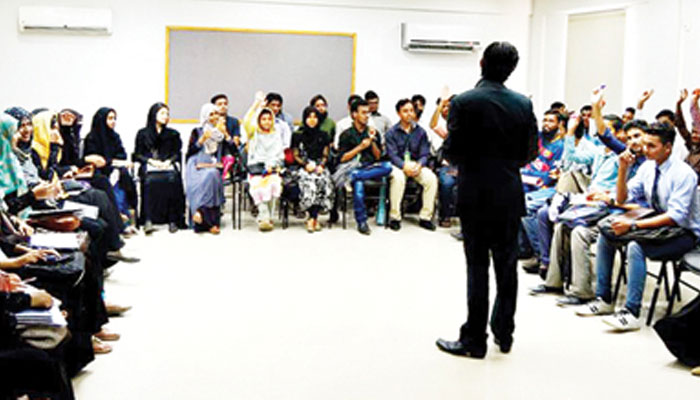Soft skills
LAHORE: Pakistanis generally lack soft skills, which refer to a set of personal attributes, communication abilities and interpersonal skills that enable individuals to interact effectively and harmoniously with others.
Soft skills are crucial in trade and industry, as their absence impedes productivity. Unlike technical or ‘hard’ skills, which are specific to a job or task, soft skills pertain to how individuals conduct themselves in various environments.
They encompass communication, teamwork, problem-solving, adaptability, leadership, emotional intelligence, time management and critical thinking.Employees with strong communication, teamwork and leadership skills contribute to more efficient work processes and better cooperation within organizations, resulting in higher productivity.
Problem-solving and critical thinking skills are essential for fostering innovation and adapting to new market demands or technological changes, thereby leading to economic growth.
The absence of soft skills in the Pakistani workforce and among entrepreneurs creates a toxic culture that adversely impacts productivity. In an interconnected global market, countries with a workforce that excels in soft skills, such as communication and adaptability, can attract more international businesses and investments.
Skills like resilience, networking and negotiation are crucial for entrepreneurs, helping them build and scale businesses, which in turn boosts economic activity.Some economies recognize the importance of soft skills and have integrated them into their educational systems.
These countries include Finland, Singapore, the US, Australia and Germany. Unfortunately, our education system mostly discourages the development of soft skills. Our classrooms are teacher-centred, especially in contexts where active participation is necessary for developing these skills.
Teacher-centric classrooms, where the teacher lectures and students are passive listeners, are not conducive to the development of soft skills like communication, teamwork and problem-solving.
Soft skills are best developed through active engagement, discussions, debates and group work.In a passive classroom, students miss opportunities to practice communication, negotiate ideas, and build confidence in expressing themselves.
Soft skills involve critical thinking, which often requires interactive learning environments where students are encouraged to question, solve problems, and think creatively. A passive classroom discourages these behaviours.
Skills such as teamwork and collaboration require students to work in groups, share ideas, and engage in collective problem-solving. A teacher-centred approach limits these experiences, focusing instead on rote learning. Soft skills, unlike theoretical knowledge, are learned through experience.
In classrooms where students do not have the chance to participate in discussions or real-life simulations, they are less likely to develop the interpersonal and critical thinking skills necessary for their future careers.
In any economy, the ability to communicate clearly, build relationships, and persuade potential customers is essential for brand building, customer satisfaction, and sales growth. Poor communication can lead to misunderstandings, customer dissatisfaction, and missed opportunities. When engaging in export marketing, businesses must communicate effectively across cultures, negotiate, and build relationships with international clients.
The lack of proper communication and convincing skills, as generally observed in Pakistan, leads to failures in entering new markets, misunderstandings in contracts, or ineffective marketing strategies.
Soft skills are foundational in building and maintaining social relationships, both personally and professionally. Effective communication, empathy, and emotional intelligence foster stronger bonds between individuals and teams, promoting trust and collaboration. In a business context, these relationships are critical for networking, partnerships, and customer loyalty, all of which contribute to long-term economic success.
-
 Caleb McLaughlin Shares His Resume For This Major Role
Caleb McLaughlin Shares His Resume For This Major Role -
 King Charles Carries With ‘dignity’ As Andrew Lets Down
King Charles Carries With ‘dignity’ As Andrew Lets Down -
 Brooklyn Beckham Covers Up More Tattoos Linked To His Family Amid Rift
Brooklyn Beckham Covers Up More Tattoos Linked To His Family Amid Rift -
 Shamed Andrew Agreed To ‘go Quietly’ If King Protects Daughters
Shamed Andrew Agreed To ‘go Quietly’ If King Protects Daughters -
 Candace Cameron Bure Says She’s Supporting Lori Loughlin After Separation From Mossimo Giannulli
Candace Cameron Bure Says She’s Supporting Lori Loughlin After Separation From Mossimo Giannulli -
 Princess Beatrice, Eugenie Are ‘not Innocent’ In Epstein Drama
Princess Beatrice, Eugenie Are ‘not Innocent’ In Epstein Drama -
 Reese Witherspoon Goes 'boss' Mode On 'Legally Blonde' Prequel
Reese Witherspoon Goes 'boss' Mode On 'Legally Blonde' Prequel -
 Chris Hemsworth And Elsa Pataky Open Up About Raising Their Three Children In Australia
Chris Hemsworth And Elsa Pataky Open Up About Raising Their Three Children In Australia -
 Record Set Straight On King Charles’ Reason For Financially Supporting Andrew And Not Harry
Record Set Straight On King Charles’ Reason For Financially Supporting Andrew And Not Harry -
 Michael Douglas Breaks Silence On Jack Nicholson's Constant Teasing
Michael Douglas Breaks Silence On Jack Nicholson's Constant Teasing -
 How Prince Edward Was ‘bullied’ By Brother Andrew Mountbatten Windsor
How Prince Edward Was ‘bullied’ By Brother Andrew Mountbatten Windsor -
 'Kryptonite' Singer Brad Arnold Loses Battle With Cancer
'Kryptonite' Singer Brad Arnold Loses Battle With Cancer -
 Gabourey Sidibe Gets Candid About Balancing Motherhood And Career
Gabourey Sidibe Gets Candid About Balancing Motherhood And Career -
 Katherine Schwarzenegger Shares Sweet Detail From Early Romance Days With Chris Pratt
Katherine Schwarzenegger Shares Sweet Detail From Early Romance Days With Chris Pratt -
 Jennifer Hudson Gets Candid About Kelly Clarkson Calling It Day From Her Show
Jennifer Hudson Gets Candid About Kelly Clarkson Calling It Day From Her Show -
 Princess Diana, Sarah Ferguson Intense Rivalry Laid Bare
Princess Diana, Sarah Ferguson Intense Rivalry Laid Bare




